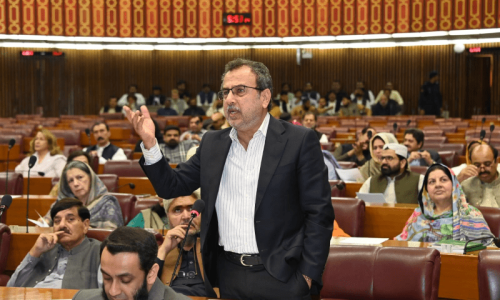• NA panel to hold next meeting in Karachi to judge performance
• KE seeks 51 paise tariff hike for August
ISLAMABAD: Despite overcapacity in the system and its resultant unaffordable cost to consumers, the complaints about overbilling, overcharging and extensive loadshedding, particularly in Karachi, continued to echo at the parliamentary and regulatory forums on Thursday.
Notwithstanding defence from its management, K-Electric remained under severe criticism — both at a meeting of the National Assembly’s Standing Committee on Power and at a public hearing called by the National Electric Power Regulatory Authority (Nepra) — for operating expensive plants, resorting to 6-18 hours loadshedding and overall poor performance. Consumer representatives from Karachi also disapproved of Nepra’s role in protecting consumer interests.
The parliamentary committee meeting and the Nepra hearing on KE’s request for a 51 paise per unit increase in its fuel cost adjustment (FCA) for April took place simultaneously in the parliament house and the Nepra headquarters.
The meeting of the Standing Committee on Energy, chaired by MNA Muhammad Idrees, expressed concern over the poor performance of K-Electric, said an announcement made by the National Assembly, which decided to convene its next meeting in Karachi to witness KE’s performance so that complaints could be addressed appropriately.
MQM’s Aminul Haq reported that Karachiites were subjected to 4-18 hours of loadshedding even during these days of mild weather. The power supply, suspended purportedly for technical faults, took 18-36 hours to restore. He also questioned the status of the earthing of electricity poles over the last five years. He demanded that a third-party audit be ordered to confirm KE’s claim of 100 per cent earthing of poles for safety.
KE’s Chief Executive Officer Moonis Ali told the committee that loadshedding in high-loss areas spanned 4-6 hours, but there was no such thing in other areas unless there was some technical fault. He also told the committee that KE had 230,000 poles, which had now been properly earthed, and no incident happened in the last two years.
He said the KE was even penalised by the regulator for electrocution in a third-party jurisdiction outside KE’s purview.
Similar complaints of loadshedding and overbilling were also made by members from Khyber Pakhtunkhwa.
The committee directed that Ministry of Energy (Power Division) take stringent measures to prevent the consumers from overcharging in different heads of electricity bills and unnecessary loadshedding in other parts of the country and report back to the committee in its next meeting.
The committee welcomed the constitution of a Special Task Force to review the contracts made by successive governments with independent power producers (IPPs) to lessen the overburden on consumers and called for complete details of agreements made with IPPs in the next meeting.
Nepra hearing
At the public hearing at Nepra, Jamaat-i-Islami’s Imran Shahid, Karachi Chamber of Commerce’s Tanveer Barry, industry representative Arif Bilwani, former KE executive Aneel Mumtaz and others criticised both KE and Nepra for operating and allowing inefficient plants, respectively, resulting in KE’s fuel cost of Rs24 per unit in August compared to Rs8.8 in the national grid. They said Nepra had ordered KE to refrain from revenue-based loadshedding and restrict power cuts to pole-mounted transfers (PMTs) two years ago but had not been honoured by the utility.
KE’s finance team said their plants were not inefficient and comparable to those in the national grid. It was reported that KE had sought an extension in the deadline for PMT-based power cuts but had encountered specific challenges, including additional costs that the utility was taking up with the regulator for approval and guidance.
Mr Barry said Discos’ FCAs were negative, but KE was seeking an increase because of some inefficient plants. He demanded to ensure that annual capacity tests should be conducted for KE’s plants. He said industrial consumption was going down because of expensive electricity and demanded that inefficient plants should be shut down and KE should purchase more electricity from the national grid.
The KE had sought 51 paise per unit additional fuel adjustment for August to collect about Rs853 million more from its consumers in October’s billing. This is on top of the Rs3.1 per unit FCA KE had demanded from the power regulator for July to collect Rs6.2bn.
Earlier, Nepra had allowed KE to charge about Rs10.5bn from consumers through Rs5.76 per unit adjustments in October and November bills against two consumption months of May and June. Under that decision, KE will charge FCA of Rs2.59 and Rs3.168 per kWh through October and November billing, respectively.
Under the tariff mechanism, changes in fuel cost are passed on to consumers on a monthly basis through an automatic mechanism. In contrast, quarterly tariff adjustments on account of variations in power purchase price, capacity charges, variable operation and maintenance costs, use of system charges and the impact of transmission and distribution losses are built into the base tariff by the federal government.
Published in Dawn, October 4th, 2024













































Dear visitor, the comments section is undergoing an overhaul and will return soon.